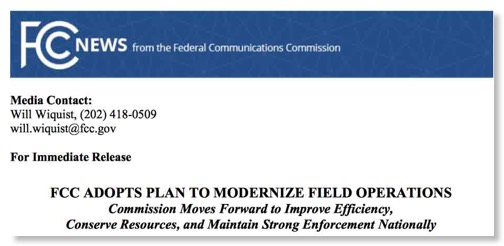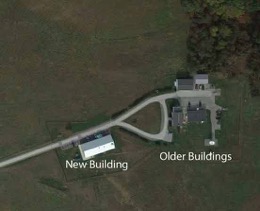"Field Office Modernization" OR Spectrum Enforcement Cutback

Yesterday FCC at a public commission meeting voted unanimously to
"modernize the agency’s field operations within the Enforcement Bureau. The proposal will improve efficiency, better position the agency to do effective radio interference detection and resolution and meet other enforcement needs, and save millions of dollars annually after implementation is complete."
The decision was in an Order that was adopted and released immediately. The Order states
The Field will embark on a program to update its equipment and employee skillset to address the likely issues that will accompany new and expanded uses of spectrum. This program will include the expanded use of remotely operated monitoring equipment to supplement field staff, as well as the identification and use of portable devices capable of assessing interference issues in bands expected to experience heavy spectrum use. Upon completion of all required implementation steps, the Commission will first apply the net savings resulting from this reorganization effort to this program, before applying those monies to the agency’s general fund. The net savings will not be used to increase the number of full-time non-field-related employees in the headquarters office of the Enforcement Bureau.
Now recall that TR Daily previously reported "FCC officials also have told stakeholders that the field operations would get the first shot at any money the FCC saves by closing field offices." So where are the savings going? Will there really be enough money after all these jobs are eliminated "to update its equipment and employee skillset"? While a statement has been made that savings can not be used to increase EB front office bureaucrats - comments were made at the commission meeting that EB front office bureaucrats have actually have increased significantly in the past few years - there is now little assurance it will actually go to equipment and training.
Paragraph 15 of the Order states "IT IS FURTHER ORDERED THAT all Enforcement Bureau field agents shall have electrical engineering backgrounds." Your blogger was educated and overeducated in electrical engineering. He has actually worked in spectrum enforcement. Focusing on academic credentials for such work is naive. Perhaps the intent was not to have non techies, but the skill set for solving spectrum enforcement problems in the field has little to do with most EE curriculums these days. Yes, some universities such as Virginia Tech, UCSD, NYU (now merged with "Brooklyn Poly"), and University of Texas-Austin have programs in wireless technology, but the vast majority of EE graduates have virtually no exposure to wireless technology, focusing on issues such as software engineering and semiconductor design and manufacturing. This coupled with the totally inept technical staff recruiting FCC has had for the past decade means less capability in new hires, not more. For spectrum enforcement, you need people who really understand spectrum issues intuitively. Let us go back to the MGM-produced WWII era film "Patrolling the Ether". When FCC wanted good agent then it hired ham radio operators. While having a ham license is not a perfect predictor of success, it is a better predictor of success than simply having an EE degree given the state of EE education in wireless issues now. One has to hire good people, not take short cuts in focusing on credentials!
For the past 3 decades, ever since Ed Minkel became the first Managing Director, FCC has avoided paying for personnel relocations. Will FCC pay for relocations related to this downsizing? For example, will staffers whose jobs are eliminated be eligible for FCC paid relocation to another office with a vacancy or to Washington if they are selected for a job there? We believe that the near total absence of FCC-funded relocations were both a major contributor to poor morale in field offices and has denied FCC headquarters of the historic flow of individuals with field experience and actual problems of licensees. The 2016 FCC Budget has only $55k for Budget Object Classification Codes 22, "Transportation of Things" and there is no indication of any budget for the subcategory "2210 Change of Official Station".
Finally a word to the GPS, aviation, and consumer electronics industries: Your trade associations, GPS Innovation Alliance, AOPA "Protecting your freedom to fly", Airlines for America, and Consumer Electronics Association were totally silent during the several month public debate on this downsizing that even under the best of circumstances will result in a lot fewer "boots on the ground". The broadcast industry, cellular industry, and public safety interests spoke up loudly during the deliberations on "modernization"/downsizing and as a result they got specific assurances that their interests would be attended to. Your industries were totally silent. Therefore do not be surprised to see the outcome of less spectrum enforcement on your industries may be much more severe than on those who spoke up!
- GPS: The GPDS industry is very susceptible to jamming sometimes called "privacy protection devices". FCC has the legal authority to both stop jamming and to stop the marketing of jamming devices. Will have the number of field agents and have the number of field office improve their capability?
- Aviation interests: The report that started this downsizing clearly stated that since FCC-enforced antenna marking and lighting issues have high compliance now less enforcement is needed. Fortunately aviation collisions into towers that are poorly marked, poorly lighted, or reported in incorrect locations are rare, but you know what the consequences of such collisions are! A lot of tower owners will know they are hundreds of miles away from the nearest FCC office and that the likelihood of marking and lighting enforcement has just decreased markedly. So why hire a tower caliber to replace that bulb? Fly carefully now!
- Consumer Electronics: FCC Rules serve to both limit interference and to create a "level playing field" for firms competing in the manufacture and sale of consumer electronics. In the consultant's report that lead to this downsizing, equipment marketing enforcement was never mentioned. So don't expect much in the future!




![Validate my RSS feed [Valid RSS]](valid-rss-rogers.png)

